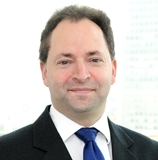
David Gittleson, has a unique insight into what’s happening in the financial services market. He started his career as a trainee chartered accountant based in Coopers and Lybrand’s consulting practice and now is Managing Partner for Financial Services Advisory across EMEIA for Ernst and Young. We talked to David about his career and his thoughts on what is in store for the financial services market in the future.
How did you become a consultant?
I joined an innovative scheme Coopers and Lybrand ran in 1989, where you trained to be a chartered accountant but you were based in their consulting practice. So I was able to get experience of auditing and consulting and decided that consulting was what I actually enjoyed, and from there I started my career working on financial services clients.
What motivates you?
The variety of the work and the quality of the people you work with. No project is ever the same and as a consultant you want to make a difference for each particular organisation, whether it’s bringing insight, or helping them execute change more effectively.
It has also been a very interesting and demanding time to be in financial services; the challenges that our clients face, and those we work with them on are complex and impact their businesses in fundamental ways. While it’s not easy, and often challenging, it’s motivating to be involved when there is such wholesale change in the FS market.
What will we see happening in financial services in the next 12 months?
Clearly the banking community is looking to increase customer loyalty and repair some of the damage done during the crisis so the focus on customer is a real priority. Our clients are looking at further developing their distribution channels, reconsidering their product ranges and improving the overall customer experience.
There will continue to be significant regulatory change for the industry to deal with – – one of the main challenges is understanding what regulation means for their business models; with the changes in capital requirements and liquidity requirements they have to decide which are the right customer segments, what are the right products, what’s the right operating model.
Regulators are also keen to increase competition and encourage new entrants into the financial services market, which is not easy.
The UK consulting market gets a lot of its income from financial services. Is that sustainable?
Financial services are a very significant part of the overall UK economy. We have a strong reputation worldwide in terms of innovation in the industry and being seen as leaders globally in many areas. But with that comes rightly a lot of scrutiny and a lot of expectation. I believe the UK will continue to play a central role in financial services globally, notwithstanding some new financial centres that are emerging around the world.
One of the exciting parts of my role is my EMEIA remit, coordinating our work across the region and working with leaders in our Americas and Asia Pacific businesses to find global solutions for clients. It’s clear from the conversations we are having at that level that the UK remains pivotal in the future of financial services.
What have you enjoyed about your career in consulting?
There is great satisfaction on successfully delivering a great project for a client. I've also enjoyed building consulting businesses. However, a lot of my personal satisfaction comes from the enjoyment of working in great teams, and groups of people that you like working with and learning from. I was fortunate in the earlier stages of my career to work on some interesting, high-profile projects and I am still in contact with the clients and the team who have scattered across the market and gone on to do extraordinary things.
One of the challenges in the role is that no sooner have you met and bonded with great people on a project, and got to know clients and colleagues, than you are posted on the next project and risk forgetting about them. I think that the more that you can maintain your networks and stay in contact, see people for a coffee, keep in touch, the better the role is. It’s actually a relatively small market and as you go through your career keeping in touch is rewarding as you see them develop through their career and often get to work with them again.
